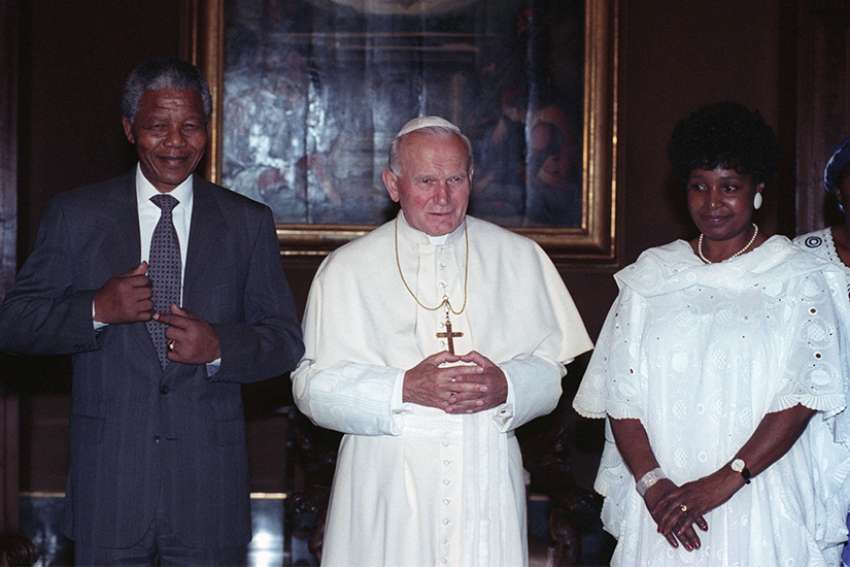St. John Paul II poses with Nelson Mandela and his wife, Winnie Madikizela-Mandela, in 1990 at the Vatican. The April 14 funeral service for Madikizela-Mandela, who died April 2 at age 81, was attended by tens of thousands of people and was followed by a burial ceremony at a memorial park north of Johannesburg.
CNS photo/Luciano Mellace, Reuters
Catholic leaders: Winnie Mandela was a friend to South Africa's poor
By Catholic News Service
CAPE TOWN, South Africa – Anti-apartheid activist Winnie Madikizela-Mandela was always a friend to South Africa's poor, said church leaders who took part in a two-week mourning period that culminated in her burial as a national hero.
"Victims of rape and all kinds of abuse always knew that they could call on Winnie, who would be there for them," said Bishop Victor Phalana of Klerksdorp.
Often called the "Mother of the Nation" and "Mama Winnie," the ex-wife of the late South African President Nelson Mandela "mothered everybody," said Bishop Phalana.
Madikizela-Mandela died April 2 at age 81. The April 14 funeral service in Soweto, a township outside Johannesburg, was attended by tens of thousands of people and was followed by a burial ceremony at a memorial park north of Johannesburg.
Madikizela-Mandela "was (a) very committed woman in her faith," said Precious Blood Sister Hermenegild Makoro, secretary-general of the Southern African Catholic Bishops' Conference.
She attended the Wesley Methodist Church in Meadowlands and spent five hours at the Good Friday service there three days before her death, Sister Makoro told Catholic News Service April 12.
Sister Makoro said she and the conference's associate secretary-general, Stigmatine Father Patrick Rakeketsi, visited the family before the funeral on behalf of South Africa's Catholic Church and "were well received" by Madikizela-Mandela's daughters and other family members.
Madikizela-Mandela, who had a "complex history," was a "courageous leader," the bishops' conference said in a statement.
"In her resistance to oppression and in her hatred of injustice, she inspired a whole country, galvanized the youth and inspired women," it said.
Noting that Madikizela-Mandela had "a suffering and impetuous heart," the bishops said that witnessing the daily "deep humiliations" of her people and observing as a social worker the injustices and human rights abuses of apartheid "were bound to cloud the mind."
Madikizela-Mandela, who was Johannesburg's first black female social worker, was routinely harassed by apartheid security forces, imprisoned and tortured during Nelson Mandela's 27-year incarceration for his fight against white minority rule.
For Madikizela-Mandela, the anti-apartheid struggle involved separation from her husband and children, banishment and continuous surveillance, "while bearing the expectations of the oppressed millions," the bishops said.
"Her life was played out against the background of world attention," they said.
Madikizela-Mandela's reputation was tarnished when evidence emerged of the brutality of her bodyguards, known as the "Mandela United Football Club." In 1991, she was convicted of kidnapping and being an accessory to assault, but her six-year jail sentence was reduced on appeal to a fine and a two-year suspended sentence.
"The majority of the poor never stopped loving her," said Bishop Phalana, who was among thousands of South Africans, including Archbishop Buti Tlhagale of Johannesburg, at an April 11 memorial service in Soweto for Madikizela-Mandela.
Her "positive attributes were so much more than her flaws," Bishop Phalana said in an April 12 telephone interview.
"Winnie filled the role of mother for so many people who felt abandoned," he said, noting that she "shared their lives, their pains, their crying and suffering."
Tagged under:
Please support The Catholic Register
Unlike many media companies, The Catholic Register has never charged readers for access to the news and information on our website. We want to keep our award-winning journalism as widely available as possible. But we need your help.
For more than 125 years, The Register has been a trusted source of faith-based journalism. By making even a small donation you help ensure our future as an important voice in the Catholic Church. If you support the mission of Catholic journalism, please donate today. Thank you.
DONATE

